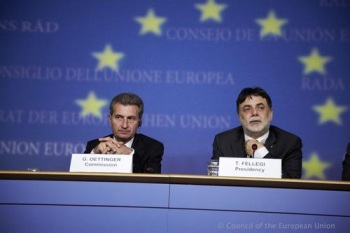EU ministers on stress tests and roadmaps
13 June 2011
European Union energy ministers have expressed their support for stress tests at EU nuclear power plants. They also warned of the effects of Germany's decision to phase out nuclear power on European energy aims and goals.
 |
| Gunther Oettinger and Tamas Fellegi address the press (Image: Council of the European Union) |
A meeting of the European Union Council on Transport, Telecommunications and Energy held on 10 June was fully briefed on the program of stress tests drawn up in reaction to events at the earthquake and tsunami-struck Fukushima Daiichi nuclear power plant in Japan. The full scope and modalities of the tests, which started on 1 June, were agreed by the European Nuclear Safety Regulators Group (ENSREG) and the European Commission in May. They cover extraordinary events such as earthquakes and flooding and the consequences of other events which could lead to the loss of safety functions.
At a press conference after the meeting Hungarian development minister Tamas Fellegi, representing the current European Council presidency, told journalists that there might be some differences in how and when the stress tests would be applied in different European Union countries. Such "minor differences" would not affect the fundamentals of the stress tests themselves, Fellegi said.
National progress reports on the tests are expected to be available by the end of September, and the European Commission and ENSREG are to prepare a report on the tests by November. The European Council is due to assess the initial findings, based on the EC preliminary report, on 9 December. All the EU stress tests should be completed by the end of the first quarter of 2012, after which a full analysis will be made, Fellegi said.
In answer to questions, Fellegi noted that terrorist threats, which have been excluded from the stress test programme, are still being considered, but that this lies outside the competency of the Energy Council because of the related highly sensitive national security issues.
Diversions to the roadmap?
The ramifications of Germany's decision to phase out nuclear power for the EU's Energy Roadmap 2050 were also discussed by ministers. The roadmap, which was informally debated by ministers in May, will aim to achieve a reduction of carbon dioxide emissions of over 90% in the power sector by 2050 while bearing in mind objectives of energy security, sustainability and competitiveness.
The implications of Germany's new energy strategy for the European internal energy market, grid infrastructure and security of supply would have to be taken into consideration on a Europe-wide scale, European Energy Commissioner Günter Oettinger said at the press conference. He promised that an objective analysis of this would be carried out by the European Commission, to be presented to the European Council in the autumn. European countries, particularly Germany's neighbours, would have to be prepared to work together as Germany phases out nuclear energy over the next 11 years.
Researched and written
by World Nuclear News